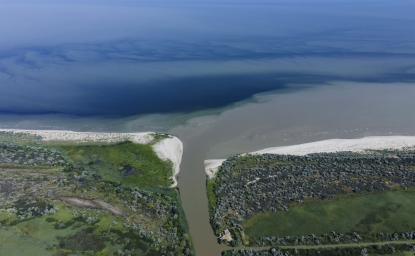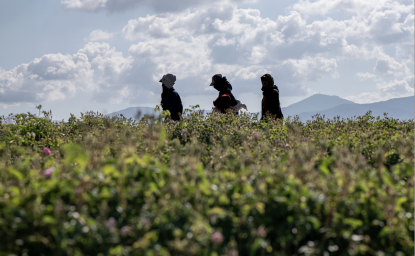Five years ago, the net export value of fish from developing counties was nearly $20 billion—more than the combined net export value of rice, coffee, sugar, and tea. By 2020, developing countries will account for almost 80 percent of total food fish production. Fisheries also play a vital role for food security: more than 2.6 billion people in developing countries rely on fish for a substantial part of their dietary protein.
Compared to other sectors of the world food economy, however, fisheries management is poorly planned, inadequately funded, and neglected by all levels of government. Fisheries around the world are overharvested and suffering from declining stocks, yet recent analyses indicate that well-managed fisheries could increase productivity five-fold. Developing countries desperately need help strengthening institutions and redirecting market forces to improve fisheries management.
With technical and financial assistance from the U.S. Agency for International Development (USAID), the Environmental Change and Security Program conducted a seven-part series that explored the management and potential of fisheries and highlighted their importance to livelihoods and national economies. Panelists contended that well-managed fisheries—backed up by enforcement to discourage illegal and unauthorized activity—can bolster communities while conserving biodiversity.
Overfishing
Many of the world's fisheries suffer from excessive harvesting, said Robert Pomeroy, an associate professor of agriculture and resource economics at the University of Connecticut. Speaking at the inaugural seminar in this series, in September 2006, he said that in Southeast Asia, for example, lax laws allow fishers to harvest three or four times more fish than the system can sustain.
Increased access to technology, such as cheap GPS systems to locate dense fish areas, also has allowed for rapid, frequent depletion of fish stocks. Meanwhile, environmental degradation and ecosystem changes—from pollution to rising sea levels—negatively affect coastal fish communities.
"The Indonesian tsunami tragedy [of 2005] showed us the vulnerability of some of these communities," said Patrick Christie, who teaches at the University of Washington's School of Marine Affairs and the Jackson School of International Studies.
Despite the shaky future of fisheries, employment in the fish sector has grown exponentially, upwards of 400 percent in the small-scale fishing market, with many entering the industry part time. In fact, the more than 50 million small-scale fishers comprise 96 percent of all fishermen. But small-scale fishers can no longer afford to buy what they catch, strained by declining per-capita availability and the subsequent increase in market price. Pomeroy said this supply-and-demand gap will continue to widen, and increase poverty, unless fishery practices are reformed.
Halting the decline of fisheries requires education, training, creative thinking and foresight, said Jacqueline Schafer, assistant administrator in the Bureau for Economic Growth, Agriculture, and Trade at USAID. She said, "We are dealing as much with a social problem as we are with an environmental problem."
It's also an economic problem. Territorial waters of developing countries are increasingly overfished, mostly by fleets from wealthy, developed nations, said Rashid Sumaila, director of the Fisheries Economics Research Unit at the University of British Columbia, at a seminar in February.
In April, Tom Grasso, director of the World Wildlife Fund's International Fisheries Conservation Program, linked overfishing to poverty. Fish are integral to the national economy in many developing countries. Yet unsustainable fishing leads to declining stocks and habitat destruction, which leads to lower incomes and increasing poverty.
Unfortunately, many developing countries lack the resources and capacity to safeguard their coastal resources and national waters. West Africa loses about $1 billion annually in economic rent from fisheries. World Bank Senior Specialist Kieran Kelleher attributes the problem to a breakdown in the rule of law. He said, "You have the right to fish, but an obligation not to abuse those rights."
Estuaries and Ecosystems
Over the past century, the global population has tripled while global water demand has increased more than six-fold, noted the USAID's Richard Volk at the December 2006 seminar. Dams capture and store water for human use, but they fundamentally alter the flow of waterways, which can profoundly affect ecosystems.
Estuaries, which form where freshwater from the land meets saltwater from the sea, are critical to maintaining healthy and productive fish populations. But as freshwater inflows are altered, naturally or through dams, the biological and chemical components of estuaries also change, threatening fish stocks and, therefore, food security and whole economies.
As people appropriate more water from river basins, less is left for aquatic and marine organisms. Volk noted that as inflows decline, less organic debris is swept downstream, which means less plankton on which fish feed; less plankton means fewer fish.
Brian Richter, director of the sustainable waters program at the Nature Conservancy, cited China's Yangtze River as an example of this chain reaction. The Three Gorges Dam and other small dams within the basin alter the water flow and, should the damming damage the ecosystem, the Yangtze basin could be devastated. "Some of the really important food sources there are fish species that are the primary source of protein for tens of millions of human beings," he said.
Before construction of Egypt's Aswan High Dam in 1965, large quantities of nitrogen, phosphorus, and silica in the Nile River supported highly productive fisheries in the Mediterranean, said Stephen Olson of the University of Rhode Island. But the dam's operation has reduced the Nile's flow by 90 percent and redfish, bass, herring, sardines, and anchovies were just a few of the fish casualties as inflow declined.
"Estuaries are literally the social safety net for hundreds of millions of people," said Volk. Richter commented, "As we are developing and utilizing water resources, we [must] preserve the natural pattern of rising and falling water levels, as well as the absolute volume of water."
Murky Waters: Ownership and Governance
A country has sovereignty over fish in waters within 12 nautical miles from its shore, as stated in the UN Convention on the Law of the Sea. But the area between 12 and 200 nautical miles is the country's exclusive economic zone (EEZ), within which fish ownership becomes murky, said David Schorr, a fellow at the World Wildlife Fund. International fish law focuses on ownership, he said, but neglects management responsibilities.
"If you go into somebody else's EEZ and you catch a fish, it belongs to your nation," Schorr said. So if a fishing vessel from a European country catches fish in Senegalese waters, then sells them back to Senegal, the transaction is recorded as an export from the EU country to Senegal. This practice has serious consequences for developing nations.
Schorr suggested international laws be amended to guarantee ownership to the countries that own the EEZs and urged the international community to adjust regulations and safety standards to encourage equitable trade. Greenpeace's Karen Sack called for establishing more protected areas where fishing is banned as well as monitoring, surveillance, and enforcement programs.
Another major problem is illegal, unregulated, and unreported (IUU) fishing, which is valued at $9 billion annually. "It undermines rule of law and the profits of good fishers," said Kelleher. For example, the fish catch off the coast of West Africa is valued at some $2.5 billion, yet West African economies capture only 25 percent of that value.
While fairer export and import rules would help boost a nation's GNP, the impacts would not necessarily trickle down to the local level. Several panelists suggested reducing demand by reducing consumption per capita in the developing world. In addition, the World Bank's Marea Hatziolos urged focusing on sustainability rather than on productivity alone. She said licensing schemes and zoning would limit access to fisheries, accompanied by finding alternative employment for fishers, such as water-based ecotourism projects.
Small-scale fishers in developing countries are increasingly threatened by commercial fishing, which requires federal and international government oversight. But countering the decline of fisheries requires bolstering institutions at the national and local levels. Kitty Courtney of Tetra Tech EM, Inc. said, "We have to encourage local governments to really appreciate the value of what they are losing by not managing their fisheries and coastal habitats."
Through sound policy, education, and proper enforcement, individuals and nations can help protect fisheries, fish, the environment, and their own well-being.
ECSP's Alison Williams contributed to this story.




